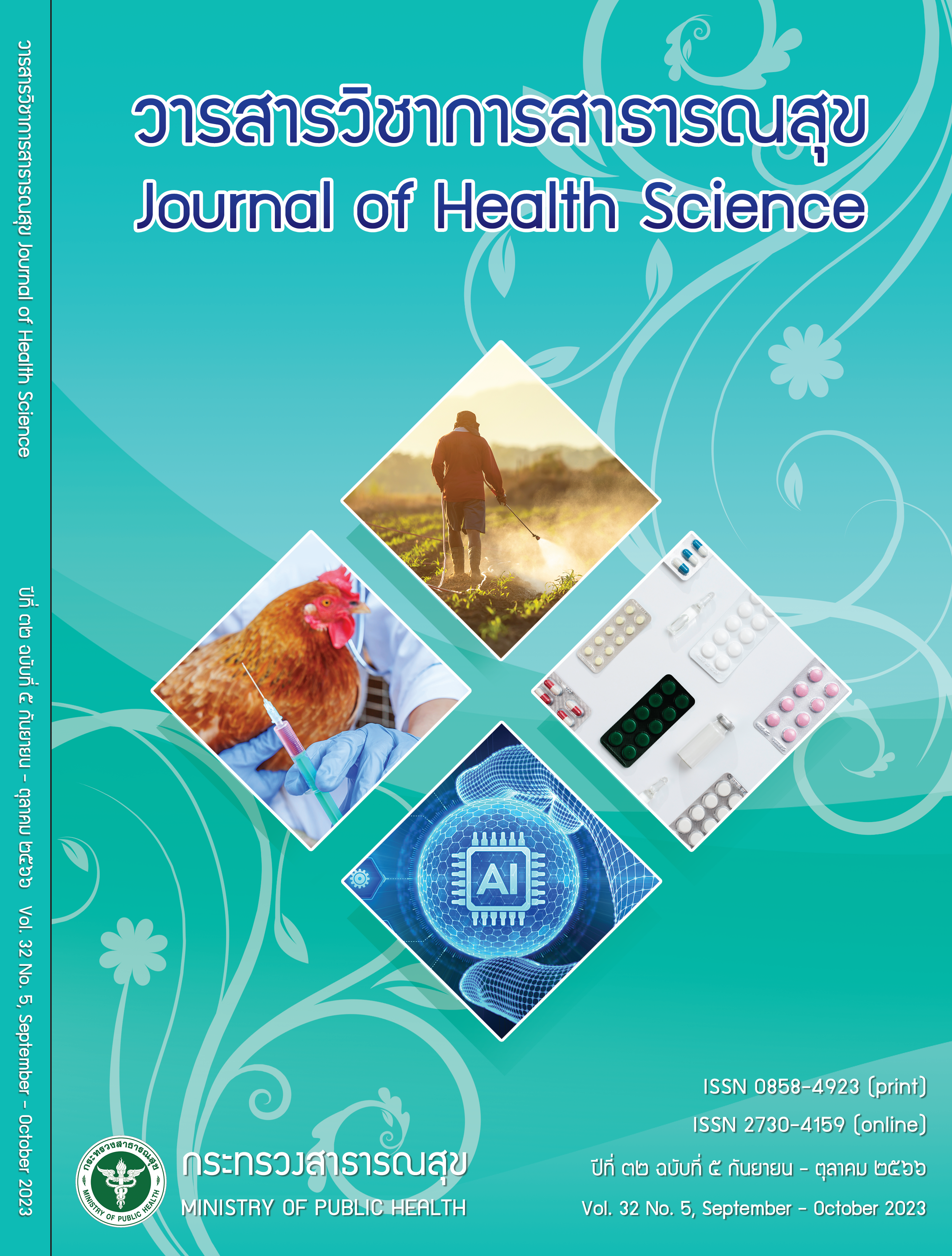Effects of Using COVID-19 Medication Protocol on Medication Error and the Results of Using Telepharmacy System for Counseling and Adverse Drug Event Monitoring in Phraphutthabat Hospital
Keywords:
COVID-19 medication protocol, medication error, telepharmacyAbstract
Initially, the system of prescribing medication to treat COVID-19 in Phraphutthabat hospital, including favipiravir, remdesivir and molnupiravir. was lack of clear prescription protocol and lack of patient monitoring after the prescription. Thus, the reported incidents of prescribing errors were as high as 4.13 times per 1,000 prescriptions and dispensing errors were 0.65 times per 1,000 prescriptions, two of which were at the D severity level, an error occurred that reached the patient. Such incidents, although unharmed, necessitated close monitoring. The purpose of this study was to investigate the effects of using COVID-19 medication protocol on medication errors and the results of using telepharmacy system for counseling and adverse drug events monitoring. This was a retrospective study conducted between 1st April and 25th June 2022. Data were analysed by descriptive statistics, Chi-squared test and Fisher’s exact test. Of the total 2,569 prescriptions the findings show that the medication errors significantly decreased from 4.90 to 1.55 times per 1,000 prescriptions (p<0.05). The prescribing errors were reduced from 4.13 to 1.55 times per 1,000 prescriptions with the B severity level, an error occurred but the medication did not affect the patient; while the dispensing error was reduced from 0.65 to 0 times per 1,000 prescriptions, respectively, compared with the revised pre-protocol incidence data. After, using COVID-19 medication protocol, 1 patient was reported diarrhea (0.04%) from molnupiravir, 6 patients reported dizziness from molnupiravir (0.23%), and 2 patients reported nausea/vomiting from favipiravir (0.07%) with mild adverse events severity level. The patient’s satisfaction score was at high level 77.75% (N=956, mean=3.89/5, S.D.=0.63). Therefore, using COVID-19 medication protocol helped reducing medication errors and the information technology system used to follow up with patients could monitor adverse drug events. Such data can be applied for patient counseling in the future so that they will be satisfied after receiving the service.
Downloads
References
Wang L, Wang Y, Ye D, Liu Q. Review of the 2019 novel coronavirus (SARS-CoV-2) based on current evidence. Int J Antimicrob Agents [Internet]. 2020 [cited 2022 Dec 18]; 55(6):1-7. Available from: https:// www.sciencedirect.com/science/article/pii/ S0924857920300984
Damdar GT. Role of clinical pharmacist in COVID-19 crisis. Hosp Pharm [Internet]. 2022 [cited 2022 Dec 18];57(1):7–10. Available from: https://journals. sagepub.com/doi/10.1177/0018578720985429
Ghasemnejad-Berenji M, Pashapour S. Favipiravir and COVID-19: a simplified summary. Drug Res (Stuttg) [Internet]. 2021 [cited 2022 Dec 18];71(3):166-70. Available from: https://www.thieme-connect.com/ products/ejournals/html/10.1055/a-1296-7935
Lai CC, Chao CM, Hsueh PR. Clinical efficacy of antiviral agents against coronavirus disease 2019: a systematic review of randomized controlled trials. J Microbiol Immunol Infect [Internet]. 2021 [cited 2022 Dec 18]; 54(5):767-75. Available from: https://www. sciencedirect.com/science/article/pii/ S16841182210- 01353
กรมการแพทย์ กระทรวงสาธารณสุข, คณาจารย์ผู้เชี่ยวชาญ จากคณะแพทยศาสตร์ มหาวิทยาลัยต่างๆ. แนวทางเวชปฏิบัติ การวินิจฉัย ดูแลรักษา และป้องกันการติดเชื้อใน โรงพยาบาลกรณีโรคติดเชื้อไวรัสโคโรนา 2019 (COVID19) สำหรับแพทย์และบุคลากรสาธารณสุขของประเทศไทย (ฉบับที่ 21) 22 มี.ค. 2565 [อินเทอร์เน็ต]. [สืบค้นเมื่อ20 ธ.ค. 2565]. แหล่งข้อมูล: https://covid19.dms.go.th/ Content/Select_Landding_page?contentId=164
National Coordinating Council for Medication Error Reporting and Prevention. About medication errors [Internet]. 2022 [cited 2022 Dec 20]. Available from: http://www.nccmerp.org/about-medication-errors
Khrueawang K. Medication error. Public Health Policy and Laws Journal [Internet]. 2018 [cited 2022 Dec 20]; 4(2):251-65. Available from: https://so05.tci-thaijo. org/index.php/journal_law/article/view/161437/- 116404
Mahomedradja RF, Van den Beukel TO, Van den Bos M, Wang S, Kalverda KA, Lissenberg-Witte BI, et al. Prescribing errors in post COVID-19 patients: prevalence, severity, and risk factors in patients visiting a post COVID-19 outpatient clinic. BMC Emerg Med [Internet]. 2022 [cited 2022 Dec 22];22(1):35. Available from: https://bmcemergmed.biomedcentral.com/articles/10.1186/s12873-022-00588-7#citeas
พรรณี ลีลาวัฒนชัย, ธนานันต์ ตัณฑ์ไพบูลย์. Favipiravir สำหรับรักษาโรคติดเชื้อไวรัสโคโรนา 2019. วารสารเภสัชกรรมโรงพยาบาล [อินเทอร์เน็ต]. 2564 [สืบค้นเมื่อ 22 ธ.ค. 2565]; 31(2):141-57. แหล่งข้อมูล: https:// he02.tci-thaijo.org/index.php/TJHP/article/ view/250567/171768
Downloads
Published
How to Cite
Issue
Section
License

This work is licensed under a Creative Commons Attribution-NonCommercial-NoDerivatives 4.0 International License.







